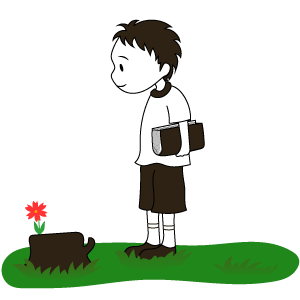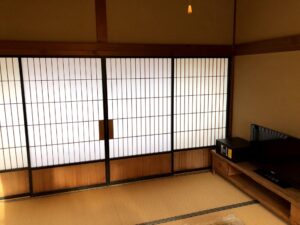I had a friend in college who used to advocate a “theory of mote”. His theory was quite simple.
He said, “There are two kinds of people. There are two kinds of people: the popular ones and the unpopular ones.”
The theory was conceived when he was in elementary school, demonstrated in junior high school, and completed in high school.
He then began to put his theory into practice in the university setting under the banner, “I don’t take guys who are not popular, regardless of gender.
This theory of attractiveness was always presented at every party or drinking session with his self-introduction, and no matter how much he was frowned upon and complained about when he started judging on his own, he never reversed his judgment.
He was certainly a lot of fun, but he said he had been splashed with wine by a woman and even got into a fistfight with her. Still, he didn’t stand by his theory.
When that happened, he would just put on a cool face and say, “That’s why I’m not popular. When he said this, the other side usually shut up.
Perhaps if an ordinary man like me had said this theory, he would have already lost his life, but he was qualified enough to advocate this “theory of being popular.
He was small in stature, but he had a Johnny-ish face, was charming, and was popular with women. He was good at talking about things other than mote theory, and there was an atmosphere in which he was somehow allowed to bring up mote theory out of the blue. He was popular no matter who looked at him.
There were no criteria to judge his theory, not his looks, family background, status, or honor, but only whether he was popular or not. In other words, it was based solely on his subjective judgment.
No matter how beautiful she was, once he judged her to be “unattractive,” he never spoke a word to her again. And, to my surprise, that judgment was almost never wrong.
He said that he had many times been challenged by other people, but no matter how drunk he was, he was never once defeated.
He would just kick them out with his usual special move: “That’s why you’re not popular.”
What is frightening about the theory of attractiveness is that it is only the subjective opinion of the person who says it. It is a theory, but it is not a theory. In other words, there is no such thing as an objective measure. If there were such a thing, the standard itself would be called into question.
Therefore, it is impossible to overturn a person’s belief that he/she thinks so, no matter how many theories the other person brings up. It is absolutely impossible to overturn someone’s subjective opinion, even with theory. The closer it is to intuition, the more so. It is a matter of inner freedom. Even God would not be able to overturn it.
That is why the “mote theory” was also known as the “invincibility theory.
He says, “When people tell the truth, they get angry. ‘People get angry when they are told the truth. The person himself knows best whether he is popular or not. A person who is popular will be popular no matter how hard he tries. Those who are not popular will never be popular no matter how hard they try.
He even went so far as to say that, although it is not an old drama, if a person suddenly becomes popular, it is only by the grace of God by chance.
And he only made friends with men and women whom he identified as popular. Those who were happy to be identified as popular by him formed a mote army around him and formed the upper group of the school caste in the university.
The sight of them clumping together and strutting proudly down the main road on campus was reminiscent of the charismatic hosts strutting down the streets of Kabukicho that were popular not so long ago.
I myself had heard of the theory of mote as an amusing theory, but in a way I respected the fact that he believed in it wholeheartedly and carried it through during his college years.
He never disliked or belittled anyone he judged to be unattractive, just not with them. He just said that it was a different world to live in, and he hoped that they would live there happily, as if they were natives of Africa.
At the same time, he said that he was popular only because he happened to live in the current era, and that if he had been born in a slightly different era, such as the Warring States Period or even the primitive era, he might not have been popular at all.
You never know what tomorrow will bring,” he said, “so there is nothing conceited about being popular now.
In this age when reputation is more important than ever, being popular or not is a naïve and serious issue. The desire to be liked by one’s subordinates and superiors at work must be connected to this issue of being irresistible and irresistible.
If so, what should an unattractive person who wishes to be popular do? He says in a dismissive way that it is useless to do anything, but there are many books on how to become popular, and if you search the Internet, you will find plenty of information that looks like that.
And relying on this information, the unattractive person strives to change his or her self. If they can’t change themselves, they go to a better college, a better company, make more money. We have no choice but to try to cover ourselves with external factors.
This, he says, is also futile. He said that such efforts to become popular will make the person even more unattractive when he or she thinks that he or she is not.
Efforts to be popular, because their purpose is so despicable, even lower a person’s dignity. The popularity that one gains from such external factors will surely come when the plating comes off. Or, they will act aggressively in an attempt to get their money back.
He would say something like, “A man who is popular does not make an effort to be popular.
Thus, I looked at them coldly as they made efforts to be popular. I could not say that he and I were good friends (according to him, I was just barely on the safe side), but I liked listening to him talk about this theory with pleasure.
People who can clearly state their subjective opinions and have the strength to do so are in a sense invincible in a group, whether they are students or working adults.
A while ago, a book titled “The Courage to Be Disliked” became popular, but no matter whether you are disliked, appalled, or ridiculed, you are powerless in the face of those who have the strength to articulate the “popularity theory” that you have constructed.
A long time has passed since then, and sometimes I suddenly remember this theory. And although I have lost touch with my friend, I am very curious to know if he still adheres to this theory. And I hope he still does.
See you soon.












